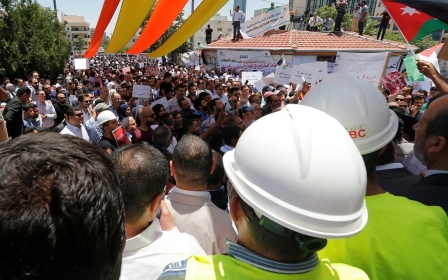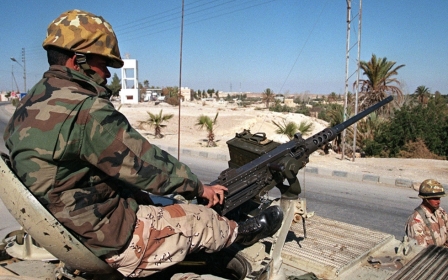Jordan's king freezes price hikes as protests continue
Jordan's King Abdullah II ordered the government on Friday to freeze new price hikes on fuel and electricity, officials said, after protests across the cash-strapped country.
Past price hikes have triggered riots in Jordan, a country of 9.5 million with few resources, burdened by poverty and unemployment.
Late Thursday and early Friday, hundreds of Jordanians demonstrated in Amman and other cities, calling for the "fall of the government" as they blocked roads with cars and blazing tyres.
'The real problem is the Saudi aid that has stopped in recent years... Jordan depends on foreign aid as the main source for the economy'
- Mohammad Ayesh, analyst
That came after the government decreed rises of up to 5.5 percent on fuels and a 19 percent hike in electricity prices, as well as laying out plans for a new income tax.
But early Friday, the king ordered the government to shelve hikes set to take effect that day as the country's Muslim majority observe the holy month of Ramadan, official Petra news agency said.
According to local news site Al Ghad, there were clashes between security forces and protesters on Friday near the Fourth Circle area where the prime minister's office is located.
Over Thursday evening, Jordanian news website 7iber's live stream showed more than 1,000 people demonstrating outside the office, chanting about the costs of fuel and bread, while Arabi 21 reported that protests had spread throughout the country.
In the northern cities of Irbid and Ajlun, some protesters cut off roads with burning tyres, while in the Tabarbour suburb of Amman motorists blocked roads with their cars.
A Facebook event set up overnight by the Jordanian Youth Movement page, and responded to by more than 13,000 people, called for protests to gather in the centre of the city on Friday night to reject the fuel price increase.
The protests on Friday follow a strike on Wednesday, called for by Jordanian trade unions, which saw a wide range of professionals protest against a proposed income tax increase that they feel hits them at a time when they are already struggling with living costs.
The law - which follows a key condition of a three-year International Monetary Fund economic programme to bring down public debt - would significantly lower the income tax threshold. Banks and industrial firms would be forced to pay taxes at a time when economic growth has been stagnant and businesses have complained of shrinking consumer demand.
Pressure over Jerusalem?
Mohammad Ayesh, a journalist and political analyst, told Middle East Eye: "The real problem is the Saudi aid that has stopped in recent years, and Jordan depends on foreign aid as the main source for the economy."
Syrian refugees living in Jordan have also been a burden on the government's finances, he said. There are just over 655,000 registered Syrian refugees in the country.
"These protests could be planned messages from Jordan to outside countries, especially Saudi Arabia and UAE," Ayesh said. "The main message would be: we have an internal crisis and we need direct aid to save the stability of the country."
'We had a lot of Emirati investors that injected money into the economy. They stopped their investments, and are asking to ease restrictions on investment to attract them again'
- Ali al-Qaddoumi, Jordanian legal advisor
Ali al-Qaddoumi, a Jordanian legal advisor based in London, said Jordan's economy has taken a hit in the past two years as Saudi and Emirati investors have stopped financing projects in the kingdom.
"We had a lot of Emirati investors that injected money into the economy. They stopped their investments, and are asking to ease restrictions on investment to attract them again," Qaddoumi said.
US President Donald Trump's decision in December to recognise Jerusalem as the capital of Israel drew street protests in Jordan. Soon after, sources told MEE, Saudi Arabia summoned King Abdullah to Riyadh and told him not to attend an Organisation of Islamic Cooperation meeting in which Jerusalem would be discussed.
Abdullah attended anyway and made his position public: "I repeat: Jerusalem is our red line... We will never give up on our demand for a sovereign and independent Palestine. We cannot be spectators in this situation because it impacts all our futures."
In February, while speaking to university students in Amman, the king drew a direct connection between the kingdom's stance on Jerusalem and its economic woes.
"The economic situation and the pressure on us is because of our political stances," he said. "There were messages [saying], 'Go along with us regarding Jerusalem and we will ease it on you.'"
A clip of his speech is being widely shared on social media.
Last month, the US officially moved its embassy to Jerusalem and is expected to present its "Deal of the Century" on Israel and Palestine at the end of Ramadan, in mid-June.
Qaddoumi, the legal advisor, said: "You need to know that pressure was put on Jordan regarding Jerusalem, which is a crucial topic as the Hashemites are the Custodian for the Muslim and Christian sites in the city.
"There is huge political pressure, and we have heard about a [Deal of the Century] scenario that gives the custodianship to another country."
Economic reform, he added, cannot be accomplished through slapping more taxes on people, otherwise protests would continue.
'Middle class is suffering'
Dr Ashraf al-Karaki, one of the protesters, told MEE on Wednesday that "the middle class in Jordan is suffering, and with this law, the financial situation will be harsher. Even the poor class is expected to pay more tax."
"Today, all the people joined the strike from different social backgrounds. The majority are apolitical people,” Karaki said.
Prices have steadily risen in Jordan over recent years as the government pushes reforms demanded by the the IMF.
The country has a public debt of some $35bn, equivalent to 90 percent of its gross domestic product.
In 2016, it secured a $723mn three-year credit line from the IMF to support economic and financial reforms and was told it must drop subsidies and raise taxes to meet conditions for future loans.
Earlier this year, Jordan as much as doubled bread prices after dropping subsidies on the staple, as well as hiking value-added taxes on several goods, including cigarettes.
The price of fuel has risen on five occasions since the beginning of the year, while electricity bills have shot up 55 percent since February.
According to official estimates, 18.5 percent of the population is unemployed, while 20 percent are on the brink of poverty.
New MEE newsletter: Jerusalem Dispatch
Sign up to get the latest insights and analysis on Israel-Palestine, alongside Turkey Unpacked and other MEE newsletters
Middle East Eye delivers independent and unrivalled coverage and analysis of the Middle East, North Africa and beyond. To learn more about republishing this content and the associated fees, please fill out this form. More about MEE can be found here.




